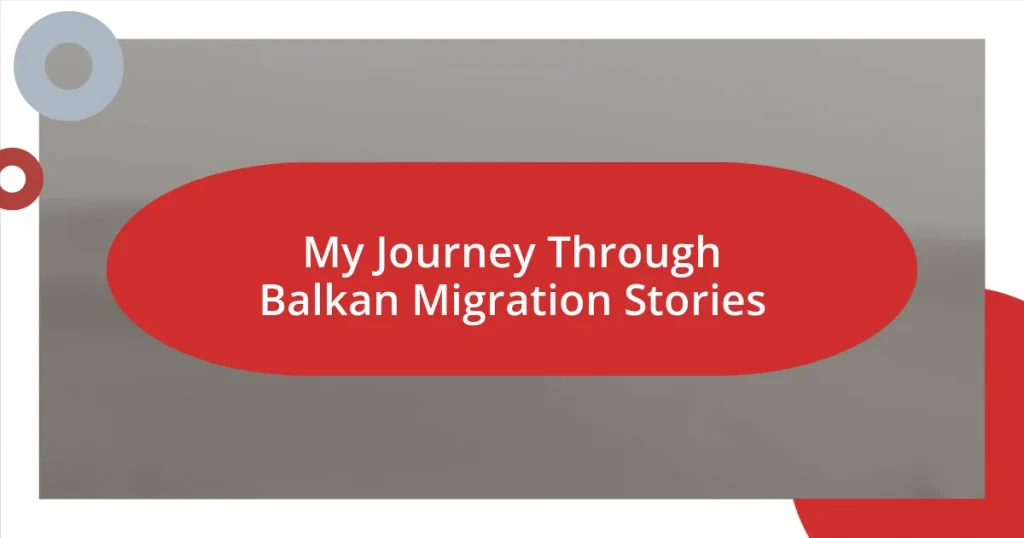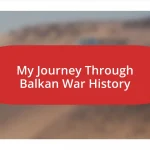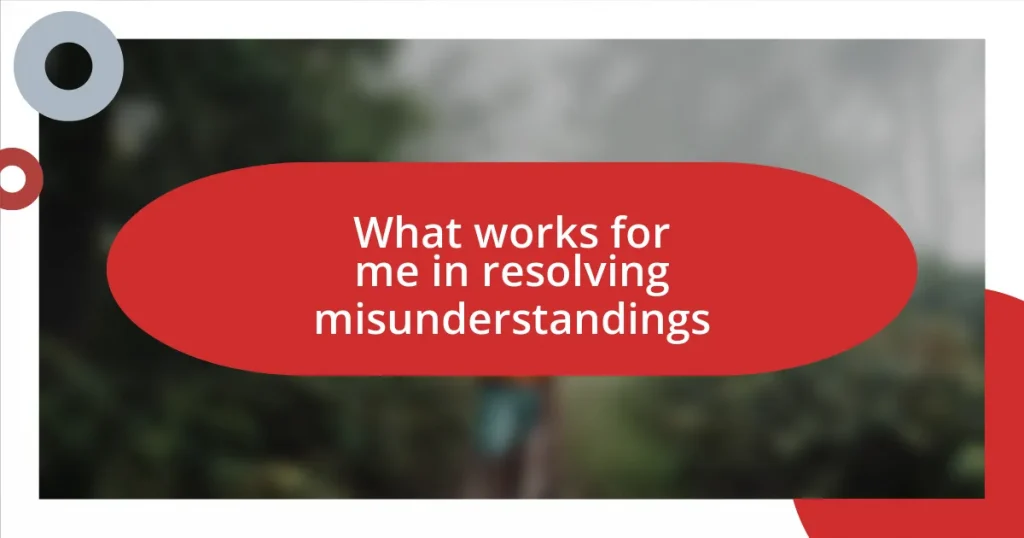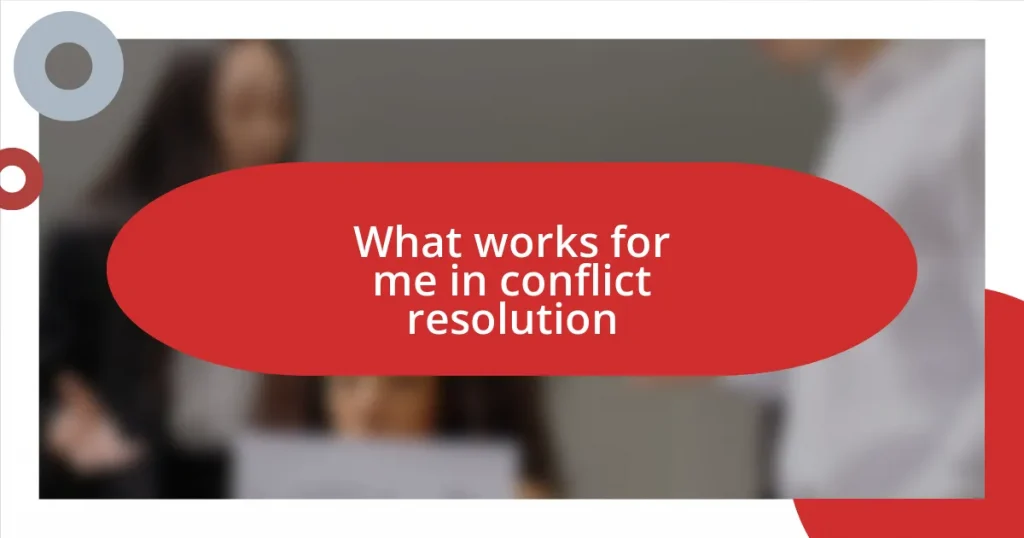Key takeaways:
- Migration in the Balkans is deeply rooted in historical conflicts and has shaped diverse cultures and identities.
- Key reasons for migration include economic struggles, political instability, education, family reunification, and environmental factors.
- Personal stories of migrants highlight resilience, hope, and the emotional toll of leaving home, enriching the understanding of their experiences.
- Support networks are essential for helping migrants adapt, providing community, emotional refuge, and aiding in the healing process amid challenges.
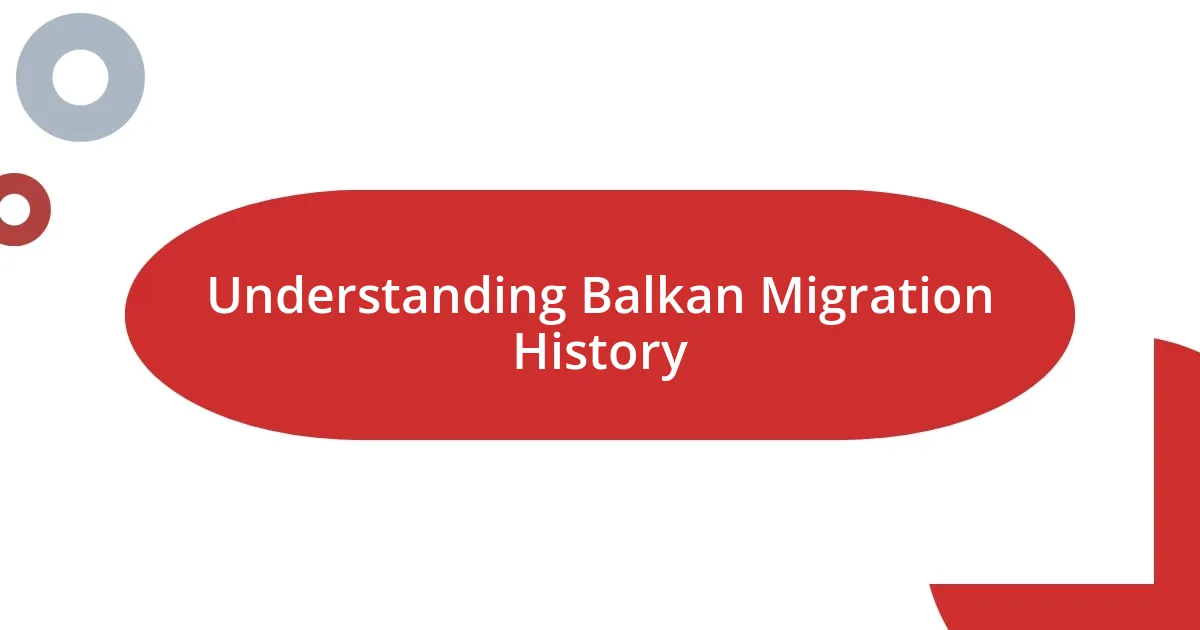
Understanding Balkan Migration History
Migration in the Balkans has deep roots, influenced by historical upheavals, conflicts, and shifting borders. I remember speaking with an elderly gentleman in a bustling market in Sarajevo, who recounted how his family fled during the Yugoslav Wars. It struck me how migration isn’t just about relocation; it’s about the loss of home and the search for safety, raising the question—how many stories like his are intertwined with the very fabric of this region?
The movement of people across the Balkans has often been a tale of resilience. When I traveled to Greece, I met a mother whose journey from Albania involved treacherous paths and uncertain futures. Her determination to provide a better life for her children resonated profoundly with me, highlighting the emotional toll of migration as both a heartbreaking necessity and an act of hope. Isn’t it incredible how migration stories can reflect our shared humanity in the face of adversity?
Understanding Balkan migration history also means recognizing the diverse cultures and identities that have emerged along the way. I found it fascinating when I learned how various communities have blended, creating vibrant traditions. It made me ponder—what narratives are often overlooked in these stories? Each migration wave has left behind unique imprints, shaping not only the land but also how we perceive each other today.
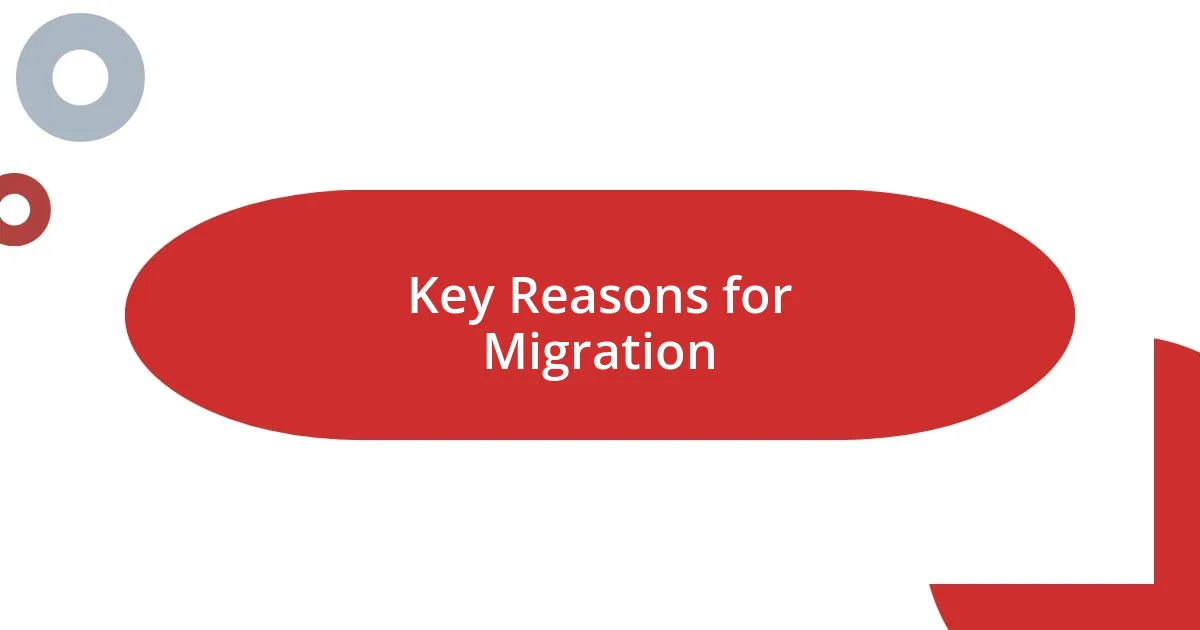
Key Reasons for Migration
Migration in the Balkans often stems from economic struggles and political instability, deeply influencing people’s choices to leave their homeland. I remember chatting with a young student in Tirana, who shared his dream of studying abroad to escape limited opportunities. His story reminded me that behind every statistic, there’s a personal aspiration fueled by the desire for growth and prosperity.
Key reasons for migration include:
- Economic Opportunities: Many seek better jobs and living conditions.
- Political Refuge: Conflict and persecution force people to flee.
- Education: Access to superior academic institutions drives youth abroad.
- Family Reunification: Individuals often migrate to join relatives in other countries.
- Environmental Factors: Natural disasters and climate change can displace communities.
Each of these reasons carries its weight, revealing how intertwined our lives are across borders. My experience at a community center in Belgrade, where I saw countless families trying to adapt and thrive in a new environment, brought this aspect into sharp focus. It was evident that migration is not just a physical journey, but an emotional one, intertwining hope, fear, and the relentless quest for a better tomorrow.
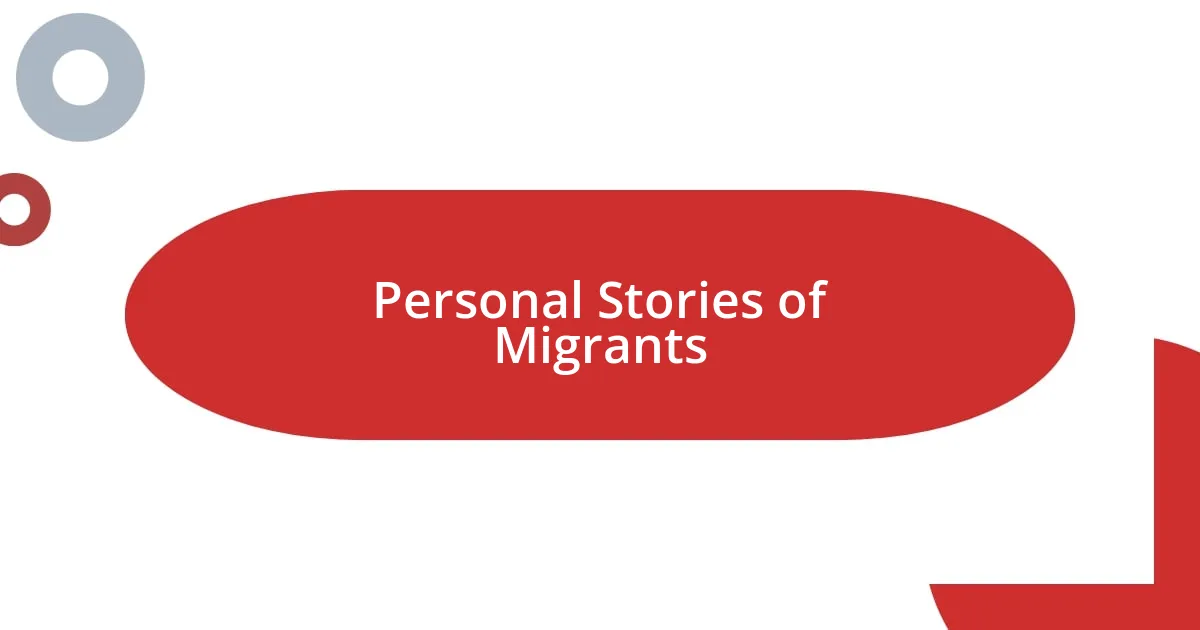
Personal Stories of Migrants
I’ve often found that personal stories of migrants resonate deeply, revealing the human side of statistics. I met a young couple in Skopje who left their rural home in search of a fresh start. Their eyes sparkled as they shared their dreams of opening a small café, a testament to their resilient spirit. It made me reflect on how hope can fuel us to transform adversities into opportunities.
One encounter that sticks with me was with an artist from Montenegro, who fled the turmoil of his past. He spoke passionately about translating his experiences into paintings, creating not only a voice for the voiceless but also a path to healing. This connection between art and migration illuminated how those journeys often birth new forms of expression, showcasing the transformative power of personal stories amid displacement.
It’s intriguing to consider how each migrant’s story adds a unique thread to the rich tapestry of the Balkans. During a conversation in a café in Belgrade, an older woman shared tales of her family’s flight during the 1990s. Her reminiscence was tinged with both sorrow and pride, emphasizing that even in hardship, there exists a profound sense of belonging forged through shared experiences. How many such stories can reshape our understanding of identity, community, and resilience?
| Key Elements | Examples from Personal Stories |
|---|---|
| Hope and Aspiration | Young couple dreaming of a café |
| Art as Expression | Artist turning experiences into paintings |
| Belonging through Shared Experiences | Older woman’s stories of family resilience |
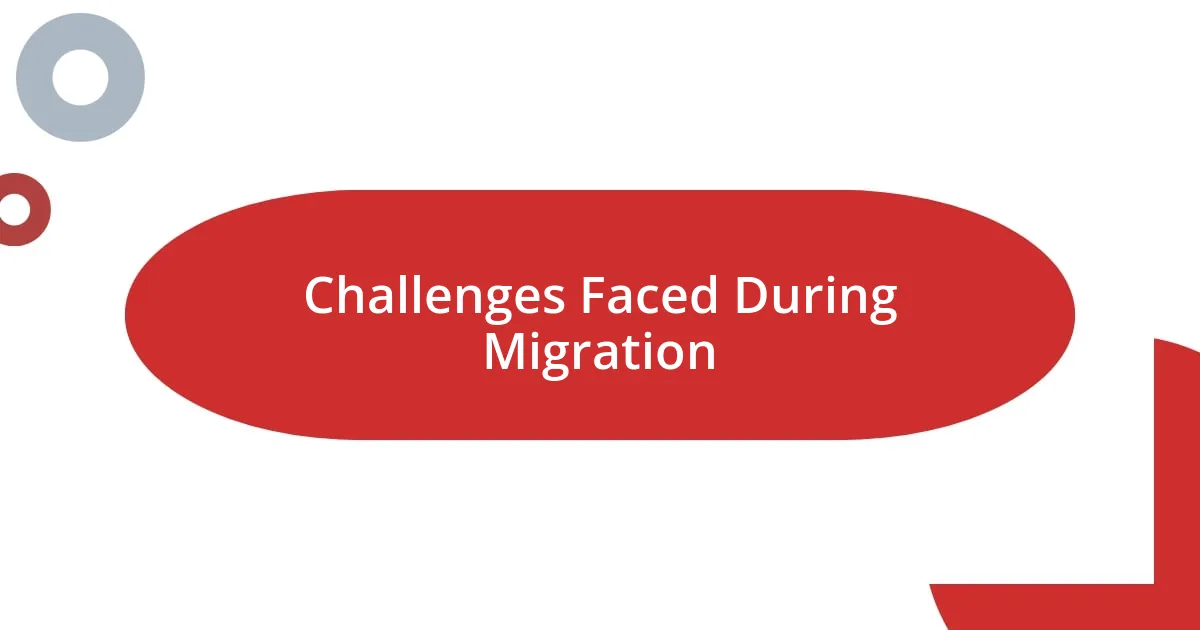
Challenges Faced During Migration
The journey of migration is often fraught with unexpected challenges that test one’s resolve. I recall a conversation with a young woman from Bosnia, who spoke of the harrowing experience of crossing borders with limited resources. She let slip that the fear of being detained was a constant shadow, a reminder that every step forward could lead to a setback. This fear isn’t just physical; it digs deeply into the psyche, causing anxiety and uncertainty about what lies ahead.
Language barriers often emerge as formidable obstacles for migrants trying to establish a new life. For instance, I once helped a family from Kosovo navigate a local government office, and their confusion was palpable. The paperwork felt overwhelming, and their frustration was evident as they struggled to express their needs in a foreign tongue. It was eye-opening to witness how communication challenges can affect access to essential services, amplifying feelings of isolation and helplessness.
Additionally, the emotional toll of leaving one’s home cannot be overlooked. One poignant experience was with a man from Serbia, who shared the weight of nostalgia as he spoke of the life he left behind. He missed the smells of his hometown and the warmth of his grandmother’s cooking, which seemed to haunt him. It made me ponder: how do we carry our homes with us when we migrate? This longing can often create a dual existence, where migrants feel neither fully integrated into their new environment nor completely at peace with their past.
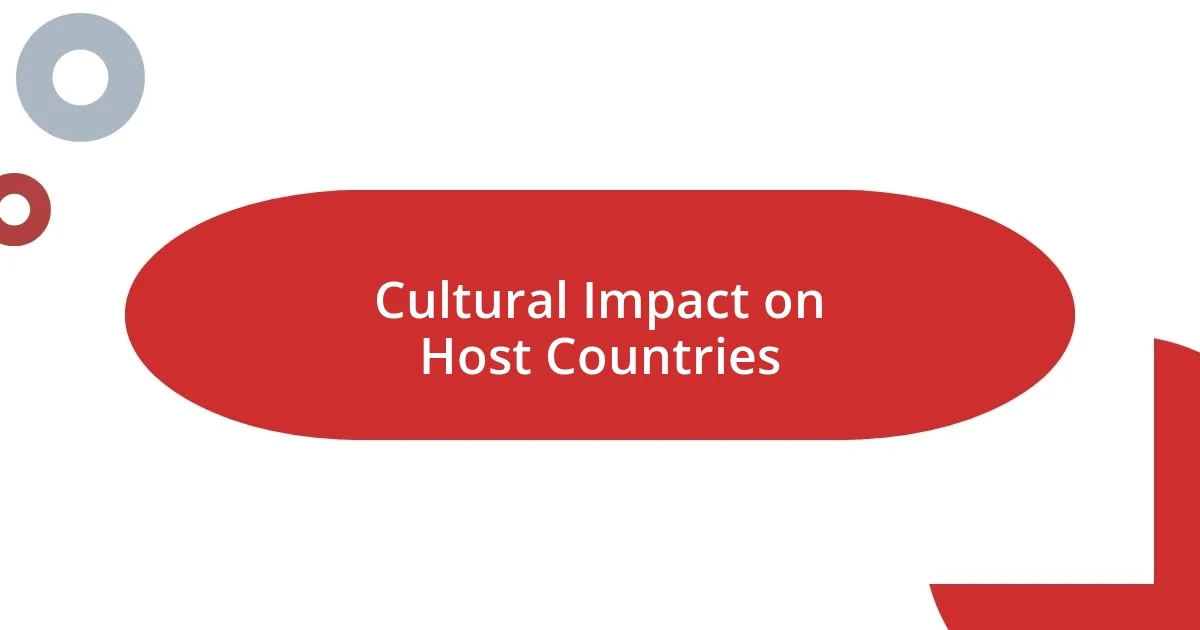
Cultural Impact on Host Countries
Cultural exchanges brought by migrants can profoundly transform the host countries in unforeseen ways. I remember visiting a vibrant festival in Sofia, where music and dance from various Balkan traditions danced across every corner. People from the city and migrant communities came together, creating a beautifully chaotic tapestry of shared joy. This interplay of diverse cultures not only enriches local traditions but also fosters a sense of community among residents, regardless of their backgrounds.
One evening, while sharing a meal with a group of friends, I met a chef from Pristina who introduced us to Kosovo’s traditional dishes with a modern twist. The experience was more than just about food; it highlighted how culinary practices could serve as a vehicle for connection. It made me think—when cultures blend, what new flavors emerge? The melding of culinary traditions often sparks curiosity and appreciation, turning meals into cultural dialogues that reflect shared histories and dreams.
However, such cultural impact isn’t always smooth. I encountered mixed reactions when a new art gallery showcasing migrant artists opened in Zagreb. While many celebrated this fresh perspective, others viewed it with skepticism, fearing a loss of local identity. It’s fascinating to consider: how do we balance preserving our roots while embracing new influences? This tension can be challenging but also offers an opportunity for dialogue, allowing host countries to evolve and expand their narratives.
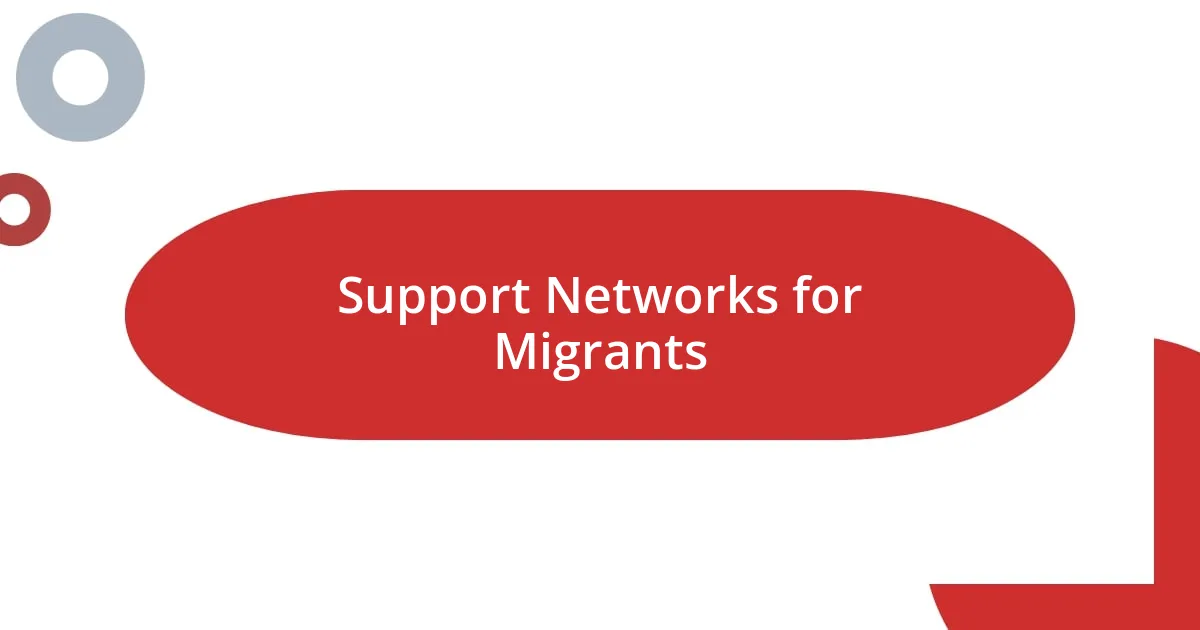
Support Networks for Migrants
Support networks play a crucial role in aiding migrants as they navigate new environments. I remember sitting down with a community leader in a bustling coffee shop in Belgrade, where she passionately described the grassroots organization she founded to support newcomers. It amazed me to hear how simple initiatives, like language classes and social events, have helped build a bridge between migrants and locals, fostering connection in what can often feel like a lonely journey.
From my experience, these informal networks can also offer emotional sanctuary. I once joined a small gathering of migrants sharing their stories in a park. The camaraderie was palpable; one woman spoke about the comfort she found in a support group that reminded her of home. It’s striking to consider: how vital are these relationships in helping people heal from the trauma of displacement? I saw firsthand how tears and laughter mingled, creating a refuge that allowed everyone to process their experiences together.
However, the existence of such support systems often hinges on community involvement and resources. Reflecting on my time volunteering at an immigrant aid center in Skopje, I encountered many individuals willing to lend a hand—yet there were also challenges. Funding was often limited, and the demand for help far outstripped what was available. This makes me wonder: how can we cultivate a stronger infrastructure for those who seek solace and support in foreign lands? The answer may lie in the power of collective action and a shared commitment to standing by one another during life’s most challenging transitions.
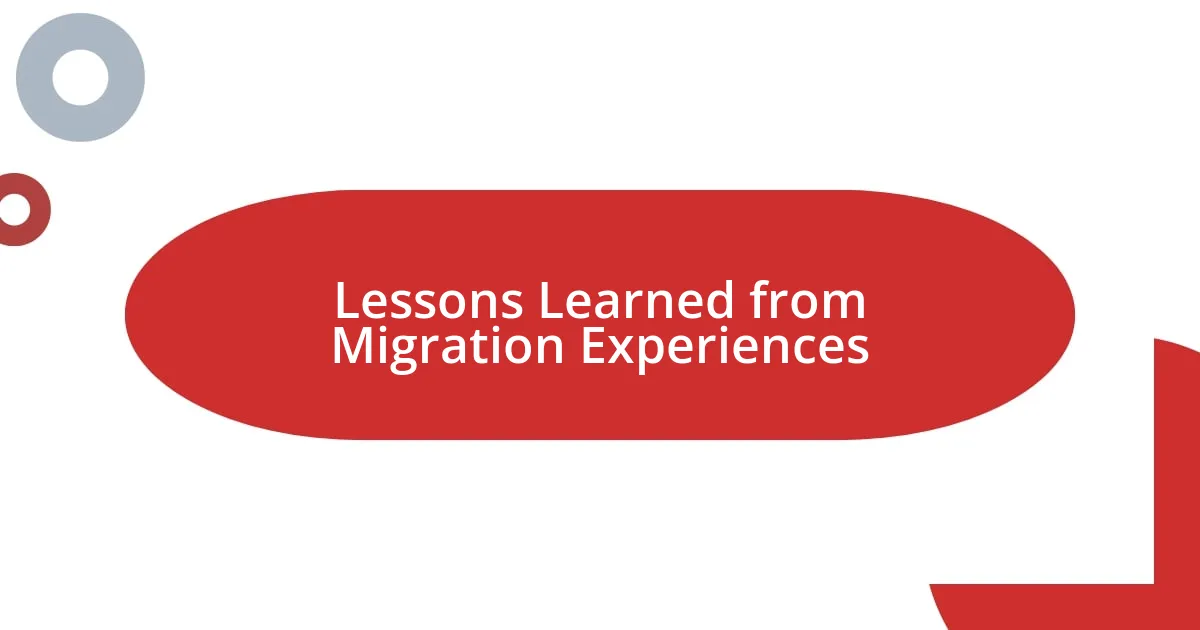
Lessons Learned from Migration Experiences
Every migration story is a tapestry woven with lessons that shape our understanding of resilience and adaptability. I recall a moment in Tirana when I met a family who had fled conflict, and they shared how they rebuilt their lives from scratch. They taught me that migration is not merely about relocation; it’s a journey of facing adversity with courage. When I heard their laughter amidst struggles, I realized that embracing change is crucial—it’s a powerful reminder that our past doesn’t define our future.
What often surprises me is the strength found in vulnerability. While volunteering at a settlement program in Sarajevo, I encountered people who openly shared their fears and dreams, creating a profound sense of mutual support. It made me think: how incredible is it that in the face of uncertainty, people can find strength in each other? This openness often leads to personal growth and stronger community ties, reminding me of the beauty in shared experiences.
Lastly, there’s a striking lesson about the importance of patience and understanding. I remember challenging conversations during a cultural exchange event in Podgorica, where different views clashed. Initially frustrating, these moments became opportunities for deeper connection and learning. It made me wonder how these uncomfortable situations can serve as a catalyst for understanding one another better. Living through migration taught me that empathy is not just an ideal; it’s a vital skill we cultivate through exchanging stories, even when opinions diverge.










